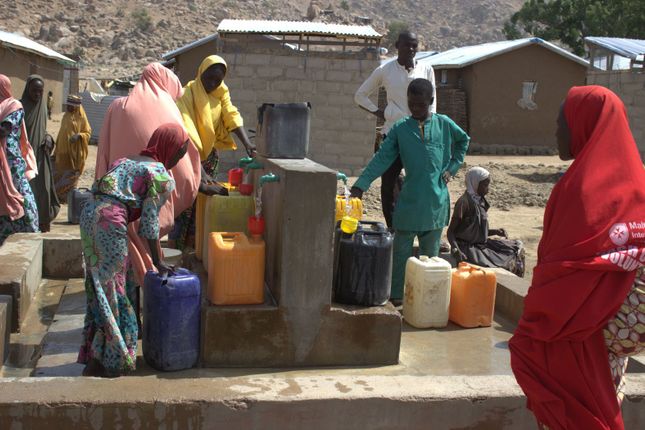
This project has been completed.
Life-saving WASH emergency aid in Pulka
Our goal is to provide life-saving WASH services to the people of Pulka. This includes improving and maintaining access to a safe and sufficient supply of drinking water through active chlorination and the establishment and maintenance of safe and decent sanitation facilities. In addition, the provision of gender- and age-appropriate hygiene information is part of the project, combined with prevention and response strategies to combat cholera outbreaks. An important aspect is the targeted support of adolescent girls. In a culturally sensitive way, we educate on menstrual health and hygiene.
In the states of Borno, Adamawa and Yobe (BAY states), 5.1 million people are currently in urgent need of water, sanitation and hygiene (WASH) interventions, the majority of whom are children (Humanitarian Response Plan 2023). This represents a significant increase compared to the 3 million people affected in 2022.
One reason for the inadequate water supply in the project region is the condition of many boreholes, which urgently need to be chlorinated and rehabilitated. The lack of clean water and adequate sanitary facilities has already led to a number of problems, including the consumption of water from unsafe sources. This contributed to more than 1,000 cases of cholera being reported in BAY states in 2022, with Borno being the most affected region with over half of the cases (OCHA 2022).
In southwest Borneo, the Pulka region is struggling heavily with the effects of the Boko Haram insurgency, which has led to extensive displacement and a very fragile security situation. The constant influx of internally displaced persons and returnees is leading to an increase in needs and an overload of scarce local resources. This also has a considerable impact on the infrastructure for water, sanitation and hygiene.
Due to security concerns, repeated conflict-related interruptions and the lack of solid partnerships with local health organizations, the possibilities for humanitarian support in the Pulka area were and are severely limited. This has contributed to a further deterioration of the health system and increased the difficulties and risks for the population.
Another aggravating factor is damage caused by wind, to which sanitary facilities and water systems are increasingly exposed due to climate change and deforestation.
The project aims to improve and maintain access to:
- a safe and sufficient supply of drinking water
- safe and adequate sanitation facilities
- appropriate gender- and age-appropriate hygiene information
- information on preparing for and responding to cholera outbreaks to reduce public health risks
- Repair of hand pumps in refugee camps and host communities
- Training of WASH committees
- Daily chlorination and testing of water
- Construction of household latrines
- Rehabilitation of sanitary blocks (latrines and showers)
- Construction of waste disposal sites for waste in camps and host communities
- Supporting sanitation control and waste management by providing sanitation kits for the WASH committees
- Training of facilitators who will educate and train adolescent girls on menstrual hygiene at different levels in the community
- Training of adolescent girls on menstrual hygiene, conducted at secondary schools
- Implementation of hygiene sensitization campaigns with cholera-tailored messages to curb cholera outbreaks
- Distribution of cholera kits to households in Camp C in Pulka
- Trainings for WASH committees on cholera control and provided disinfection kits
- Implementation of environmental disinfection campaigns in homes and sanitation facilities to reduce the spread of cholera
Country info
Capital: Abuja
Area: 923,770 km²
Population: approx. 218 Mio.
Project data
Financing: Nigeria Humanitarian Fund (NHF)
Partners: The police, health ministries, schools








